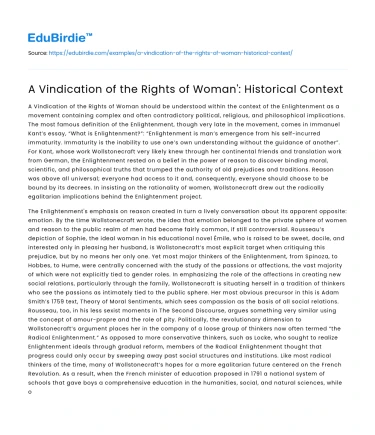A Vindication of the Rights of Woman should be understood within the context of the Enlightenment as a movement containing complex and often contradictory political, religious, and philosophical implications. The most famous definition of the Enlightenment, though very late in the movement, comes in Immanuel Kant’s essay, “What is Enlightenment?”: “Enlightenment is man’s emergence from his self-incurred immaturity. Immaturity is the inability to use one’s own understanding without the guidance of another”. For Kant, whose work Wollstonecraft very likely knew through her continental friends and translation work from German, the Enlightenment rested on a belief in the power of reason to discover binding moral, scientific, and philosophical truths that trumped the authority of old prejudices and traditions. Reason was above all universal; everyone had access to it and, consequently, everyone should choose to be bound by its decrees. In insisting on the rationality of women, Wollstonecraft drew out the radically egalitarian implications behind the Enlightenment project.
The Enlightenment's emphasis on reason created in turn a lively conversation about its apparent opposite: emotion. By the time Wollstonecraft wrote, the idea that emotion belonged to the private sphere of women and reason to the public realm of men had become fairly common, if still controversial. Rousseau’s depiction of Sophie, the ideal woman in his educational novel Émile, who is raised to be sweet, docile, and interested only in pleasing her husband, is Wollstonecraft’s most explicit target when critiquing this prejudice, but by no means her only one. Yet most major thinkers of the Enlightenment, from Spinoza, to Hobbes, to Hume, were centrally concerned with the study of the passions or affections, the vast majority of which were not explicitly tied to gender roles. In emphasizing the role of the affections in creating new social relations, particularly through the family, Wollstonecraft is situating herself in a tradition of thinkers who see the passions as intimately tied to the public sphere. Her most obvious precursor in this is Adam Smith’s 1759 text, Theory of Moral Sentiments, which sees compassion as the basis of all social relations. Rousseau, too, in his less sexist moments in The Second Discourse, argues something very similar using the concept of amour-propre and the role of pity. Politically, the revolutionary dimension to Wollstonecraft’s argument places her in the company of a loose group of thinkers now often termed “the Radical Enlightenment.” As opposed to more conservative thinkers, such as Locke, who sought to realize Enlightenment ideals through gradual reform, members of the Radical Enlightenment thought that progress could only occur by sweeping away past social structures and institutions. Like most radical thinkers of the time, many of Wollstonecraft’s hopes for a more egalitarian future centered on the French Revolution. As a result, when the French minister of education proposed in 1791 a national system of schools that gave boys a comprehensive education in the humanities, social, and natural sciences, while only teaching girls sewing and home economics, Wollstonecraft was outraged. A Vindication of the Rights of Woman was her response, offering an alternative mode of educating women to be full citizens in a revolutionary state.
Save your time!
We can take care of your essay
- Proper editing and formatting
- Free revision, title page, and bibliography
- Flexible prices and money-back guarantee
The complicated role of religion in Wollstonecraft’s work and time are noteworthy: her own beliefs were, put simply, that all people could pursue virtue, a divine gift, through use of reason. Yet her arguments also drew on more traditionally Christian thinkers, such as Dr. Richard Price, a leader of the Dissenter community, who argued that all souls were equal before God and, consequently, needed equal education in order to avoid becoming overly dependent on the esteem of others.






 Stuck on your essay?
Stuck on your essay?

